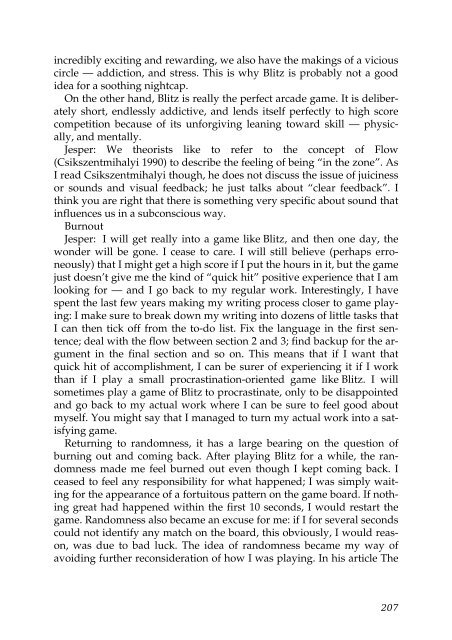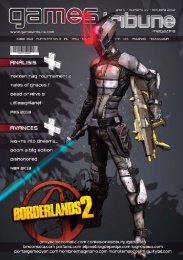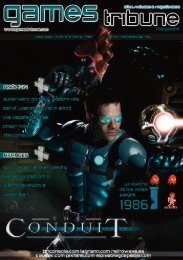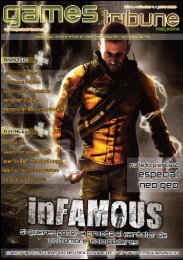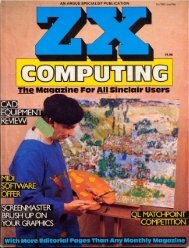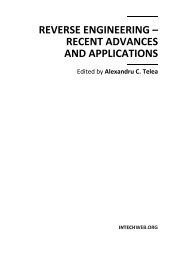Well Played 2.0: Video Games, Value and Meaning - OpenLibra
Well Played 2.0: Video Games, Value and Meaning - OpenLibra
Well Played 2.0: Video Games, Value and Meaning - OpenLibra
Create successful ePaper yourself
Turn your PDF publications into a flip-book with our unique Google optimized e-Paper software.
incredibly exciting <strong>and</strong> rewarding, we also have the makings of a vicious<br />
circle — addiction, <strong>and</strong> stress. This is why Blitz is probably not a good<br />
idea for a soothing nightcap.<br />
On the other h<strong>and</strong>, Blitz is really the perfect arcade game. It is deliberately<br />
short, endlessly addictive, <strong>and</strong> lends itself perfectly to high score<br />
competition because of its unforgiving leaning toward skill — physically,<br />
<strong>and</strong> mentally.<br />
Jesper: We theorists like to refer to the concept of Flow<br />
(Csikszentmihalyi 1990) to describe the feeling of being “in the zone”. As<br />
I read Csikszentmihalyi though, he does not discuss the issue of juiciness<br />
or sounds <strong>and</strong> visual feedback; he just talks about “clear feedback”. I<br />
think you are right that there is something very specific about sound that<br />
influences us in a subconscious way.<br />
Burnout<br />
Jesper: I will get really into a game like Blitz, <strong>and</strong> then one day, the<br />
wonder will be gone. I cease to care. I will still believe (perhaps erroneously)<br />
that I might get a high score if I put the hours in it, but the game<br />
just doesn’t give me the kind of “quick hit” positive experience that I am<br />
looking for — <strong>and</strong> I go back to my regular work. Interestingly, I have<br />
spent the last few years making my writing process closer to game playing:<br />
I make sure to break down my writing into dozens of little tasks that<br />
I can then tick off from the to-do list. Fix the language in the first sentence;<br />
deal with the flow between section 2 <strong>and</strong> 3; find backup for the argument<br />
in the final section <strong>and</strong> so on. This means that if I want that<br />
quick hit of accomplishment, I can be surer of experiencing it if I work<br />
than if I play a small procrastination-oriented game like Blitz. I will<br />
sometimes play a game of Blitz to procrastinate, only to be disappointed<br />
<strong>and</strong> go back to my actual work where I can be sure to feel good about<br />
myself. You might say that I managed to turn my actual work into a satisfying<br />
game.<br />
Returning to r<strong>and</strong>omness, it has a large bearing on the question of<br />
burning out <strong>and</strong> coming back. After playing Blitz for a while, the r<strong>and</strong>omness<br />
made me feel burned out even though I kept coming back. I<br />
ceased to feel any responsibility for what happened; I was simply waiting<br />
for the appearance of a fortuitous pattern on the game board. If nothing<br />
great had happened within the first 10 seconds, I would restart the<br />
game. R<strong>and</strong>omness also became an excuse for me: if I for several seconds<br />
could not identify any match on the board, this obviously, I would reason,<br />
was due to bad luck. The idea of r<strong>and</strong>omness became my way of<br />
avoiding further reconsideration of how I was playing. In his article The<br />
207


